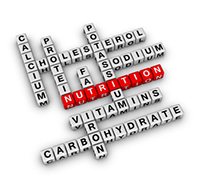
How to set up an healthy renal diet
- tips and hints for a diet that heals your kidneys
- symptoms to be taken into account when planning a renal diet
- Why it isn't possible to formulate a renal diet that's suitable for everyone?
In this post we're going to pick up the basics of something that I consider essential for anyone suffering from impaired kidney function, kidney failure or is on dialysis: a healthy diet for the kidneys.
-
How to set up an healthy renal diet
As you may know, chronic kidney disease is split into 5 stages depending on severity.- Stage one: normal or increased filtration, slight kidney damage
- Stage two: slight decrease in kidney function
- Stage three: decrease in kidney function
- Stage four: Severe decrease in kidney function
- Stage five: Kidney failure
And this is why, if you suffer from kidney disease, prior to making any modifications to your renal diet, make sure you talk about these with your doctor or nutritionist.
It is important not to get discouraged by the difficulties inherent in following a proper diet - the prize for success could be to have your life back.
In fact, in some cases it's possible to reverse kidney disease and heal the kidneys. Yes, I'm one of those lucky people. You can read my story here.
-
tips and hints for a diet that heals your kidneys
Here are some of the recommendations made to patients in the earlier stages on kidney disease:- Limit fluids intake
- Adopting a low-protein diet
- Avoid salt, phosphorous and potassium
- Obtaining adequate calories if you're losing weight
The quantity of potassium within your renal diet ought to be restricted. Diseased kidneys will have a problem handling it and getting rid of excess quantities out of your blood.
For individuals on dialysis, consuming too much potassium is often very risky for the heart and may even result in death. Men on dialysis need to stay away from foods such as avocados, bananas, kiwis, as well as dried fruit, that happen to be extremely high in potassium. These sort of renal diet may be weak in vitamins.
Nonetheless, people on dialysis should NOT take vitamin supplements that are being sold from the (blank) as they may contain vitamins and also minerals which are dangerous. Medical professionals may prescribe mineral and vitamin pills.
People with kidney diseases need to handle thirst as well as liquid consumption, including liquid which comes through vegetables and fruit. This happens because additional liquid may cause an increase in weight and swelling, and may produce hypertension leading to cardiovascular system issues. Due to these dangers, sodium also need to be reduced or maybe avoided
-
Ok, now we know what NOT to eat... but what kind of food can we consume to reach the necessary amount of daily calories for our renal diet?
- CARBOHYDRATES
carbs are the ideal energy source for your health, but not when if you have got weight problems or have diabetes.
In case your doctor has suggested a low-protein diet plan, you could replace the energy from protein with:
Fresh fruits, a loaf of bread, whole grains, and veggies. These foods supply energy, along with dietary fiber, minerals, and also vitamins. - FATS
Fats are great source of calories. Ensure that you are eating monounsaturated as well as polyunsaturated fats (extra virgin olive oil, canola (blank), safflower oil) to help safeguard your arterial blood vessels. - PROTEIN
Low-protein diet plans could be beneficial prior to starting dialysis. A medical professional or nutritionist could suggest a moderate-protein diet plan (one gr of proteins per kg of body weight per day).
Once you start dialysis, you've got to consume much more proteins. Actually, a high-protein eating plan using seafood, chicken, pork, as well as eggs is advised. The purpose is to replace the muscle tissues that you'll loose.
Individuals on dialysis should consume Eight To Ten oz . of high-protein meals each day. Healthcare provider, dietitian, or doctor might point to including egg white powder, egg whites or proteic integrators.
- CARBOHYDRATES
Symptoms to be taken into account when planning a renal diet
Individuals might have kidney disease for 30 years or maybe more without any signs or symptoms. Chronic kidney disease might seem to appear come on abruptly. when has been developing gradually for several years because of problems for the kidneys. A good way to search for chronic kidney disease, also called renal insufficiency, would be to observe the creatinine level with a blood test (blank) (blank). Kidney disease may include non-specific symptoms:- Increased urinating during night
- Passing small amounts of urine
- Swelling, of the hands and feet, as well as swelling around the eyes
- Unpleasant taste in the oral cavity and urine-like smell to the breath
- Persistent tiredness or shortness of breath
- Increase in blood pressure
- Loss of appetite
- Excessively dry, itchy skin
- Pale skin
- increased sleepiness and fatigue, loss of appetite, poor growth in children
Large amount of people most likely are not aware that probably the most frequent causes of renal system problems or kidney failure is definitely the long term utilization of pharmaceutical drug and medications, coming in contact with pesticides along with other toxins in the environment, along with, various other illnesses and diseases.


No comments:
Post a Comment